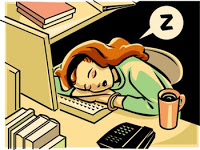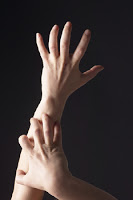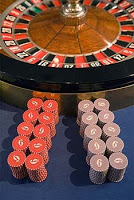Neuroscience
 An afternoon nap could boost your associative memory skills. William Fishbein and Hiuyan Lau (City University of New York) tested participants' ability to remember the English meanings of familiar Chinese characters they'd learned earlier and to determine the meaning of unfamiliar characters that shared graphical elements called 'radicals' with the learned characters. Participants who took a nap between the learning and testing phase of the study were better able to identify the meaning of the unfamiliar characters. The findings suggest that a nap helps people connect separate and discrete pieces of information and to extract general concepts. "The role of sleep in memory formation is not passive; rather, it is a period that actively fosters deeper processing of what we learned during wakefulness," said Fishbein.
An afternoon nap could boost your associative memory skills. William Fishbein and Hiuyan Lau (City University of New York) tested participants' ability to remember the English meanings of familiar Chinese characters they'd learned earlier and to determine the meaning of unfamiliar characters that shared graphical elements called 'radicals' with the learned characters. Participants who took a nap between the learning and testing phase of the study were better able to identify the meaning of the unfamiliar characters. The findings suggest that a nap helps people connect separate and discrete pieces of information and to extract general concepts. "The role of sleep in memory formation is not passive; rather, it is a period that actively fosters deeper processing of what we learned during wakefulness," said Fishbein.
Brain imaging has revealed the neural power of enduring love. Bianca Acevedo (State University of New York) and colleagues found that the same brain regions associated with addictive reward were activated when either long term lovers (still in love after an average of 21 years' marriage) or short term lovers (together for an average of seven months) viewed images of their partners. "Those who experience long-term romantic love continue to crave union with their spouses and remain highly motivated to maintain, enhance and protect their relationships, just like those in early-stage intense romantic love," said co-author Helen Fisher (Rutgers University). There were some differences between the groups. For the long-term lovers only, regions associated with monogamous pair-bonds in animal studies were activated, as were regions associated with calmness and pain suppression. For the new lovers, regions associated with obsession were triggered.
A molecular mechanism has been identified which might explain the long lasting effects of childhood maltreatment into adulthood. Tania Roth and David Sweatt (University of Alabama at Birmingham) found that newborn rats raised by a stressed caregiver rat subsequently showed signs of what's called DNA methylation in their amygdala, right the way through into adulthood. Specifically, this 'epigenetic' chemical modification was found on the DNA associated with brain-derived neurotrophic factor – a protein which is important for the development of new brain cells and the support of existing ones. "This now opens the door for future studies to explore the significance of these epigenetic changes on [human] adolescent and adult emotional well-being," Roth said, "and importantly, to explore the efficacy of drugs aimed at reversing such epigenetic marks and addressing the behavioural deficits resulting from early mistreatment."
 Researchers have discovered that there is more than one itch pathway to the brain – a finding that could open up new avenues for treatment. Frauke Kosteletzky (University of Erlangen-Nurnberg) and colleagues asked participants to report the sensations provoked by administration of either histamine or the tropical plant mucuna pruiens (cowhage). Cowhage was found to induce a sharper and more stinging sensation and also provoked stronger responses of the sympathetic nervous system. The two stimuli also responded differently to scratching which suggests they are processed differently in the brain. "Sticking cowhage spicules into healthy skin provokes a clear itch sensation, but not the 'flare reaction,' or reddening of the skin, characteristic of a histamine-mediated itch," said co-author Clemens Forster. "This suggests that other types of nerve fibres are causing the cowhage-induced itch."
Researchers have discovered that there is more than one itch pathway to the brain – a finding that could open up new avenues for treatment. Frauke Kosteletzky (University of Erlangen-Nurnberg) and colleagues asked participants to report the sensations provoked by administration of either histamine or the tropical plant mucuna pruiens (cowhage). Cowhage was found to induce a sharper and more stinging sensation and also provoked stronger responses of the sympathetic nervous system. The two stimuli also responded differently to scratching which suggests they are processed differently in the brain. "Sticking cowhage spicules into healthy skin provokes a clear itch sensation, but not the 'flare reaction,' or reddening of the skin, characteristic of a histamine-mediated itch," said co-author Clemens Forster. "This suggests that other types of nerve fibres are causing the cowhage-induced itch."
The reward areas of cocaine addicts' brains are activated by 33 millisecond, subliminal presentation of drug-related paraphernalia, such as crack pipes and chunks of cocaine. Moreover, those addicts whose brains responded more to the subliminal presentation subsequently reported the strongest craving when shown visible cues. Anna Childress (University of Pennsylvania) and colleagues who made the new findings, said the areas activated by drug cues overlapped with brain areas normally activated by sexual images. "We have a brain hard-wired to appreciate rewards, and cocaine and other drugs of abuse latch onto this system," Childress said. "We are looking at the potential for new medications that reduce the brain’s sensitivity to these conditioned drug cues and would give patients a fighting chance to manage their urges."
 Here's a tip if you don't want to gamble your money away: stay clear of on-line casinos and other betting opportunities when you haven't had a decent night's sleep. Vinod Venkatraman (Duke University) and colleagues found that after 24 hours without sleep, participants were drawn more to the possibility of large gains yet unfazed by the risk of heavy losses, compared with when they played the same gambling game after a good night's sleep. Moreover, these differences were supported by brain imaging data showing that sleep deprivation altered the participants' neural responses to losses and gains. "The advent of on-line gambling and 24-hour casinos have given us unprecedented opportunities for gambling into the night," said Venkatraman. "But it might be better for us to catch some sleep rather than staying up late gambling. We’re fighting more than just the unfavourable odds of the gambling machines."
Here's a tip if you don't want to gamble your money away: stay clear of on-line casinos and other betting opportunities when you haven't had a decent night's sleep. Vinod Venkatraman (Duke University) and colleagues found that after 24 hours without sleep, participants were drawn more to the possibility of large gains yet unfazed by the risk of heavy losses, compared with when they played the same gambling game after a good night's sleep. Moreover, these differences were supported by brain imaging data showing that sleep deprivation altered the participants' neural responses to losses and gains. "The advent of on-line gambling and 24-hour casinos have given us unprecedented opportunities for gambling into the night," said Venkatraman. "But it might be better for us to catch some sleep rather than staying up late gambling. We’re fighting more than just the unfavourable odds of the gambling machines."
Post written by Christian Jarrett (@psych_writer) for the BPS Research Digest.
- The Particular Pleasure Of Scratching An Itch On The Ankle
It's only in recent times that scientists have discovered there are dedicated nerve pathways for communicating the sensation of itch. This troublesome skin signal provides us with a mixed experience. The prickly discomfort of an itch can be agonising....
- Students: It's Time To Ditch The Pre-exam All-nighter
Lack of sleep impairs the human brain's ability to store new information in memory, researchers have found. Past research has already shown that sleep is vital for consolidating recently-learned material but now Matthew Walker and colleagues have...
- Heroin Craving Not Like Thirst For Water
When an addict craves another shot of their chosen drug, how similar is this urge to the basic human drives for sex, food and water? One way scientists have approached this question is to look at the neurocircuitry underlying craving for drugs and compare...
- Is It Bad To Gamble When Sleep Deprived?
In the annals of the incredibly obvious, researchers have shown that "late-night gambling is a risky game": Obviousman by Wiley Miller Blame boneheaded bets on your tired brain Scientists pinpoint why late-night gamblers lose big time By Linda Carroll...
- Gambling Made Easy
Wow, another study in The Annals of the Incrediby Obvious has appeared in Science. Why do I think it's time for me to give up and go home, you ask?? People More Cautious Than Reckless When Gambling . . . The study, detailed in the Jan. 26 issue of...
Neuroscience
Psychological titbits from the 38th Society for Neuroscience Annual Meeting held in Washington DC last month
 An afternoon nap could boost your associative memory skills. William Fishbein and Hiuyan Lau (City University of New York) tested participants' ability to remember the English meanings of familiar Chinese characters they'd learned earlier and to determine the meaning of unfamiliar characters that shared graphical elements called 'radicals' with the learned characters. Participants who took a nap between the learning and testing phase of the study were better able to identify the meaning of the unfamiliar characters. The findings suggest that a nap helps people connect separate and discrete pieces of information and to extract general concepts. "The role of sleep in memory formation is not passive; rather, it is a period that actively fosters deeper processing of what we learned during wakefulness," said Fishbein.
An afternoon nap could boost your associative memory skills. William Fishbein and Hiuyan Lau (City University of New York) tested participants' ability to remember the English meanings of familiar Chinese characters they'd learned earlier and to determine the meaning of unfamiliar characters that shared graphical elements called 'radicals' with the learned characters. Participants who took a nap between the learning and testing phase of the study were better able to identify the meaning of the unfamiliar characters. The findings suggest that a nap helps people connect separate and discrete pieces of information and to extract general concepts. "The role of sleep in memory formation is not passive; rather, it is a period that actively fosters deeper processing of what we learned during wakefulness," said Fishbein.Brain imaging has revealed the neural power of enduring love. Bianca Acevedo (State University of New York) and colleagues found that the same brain regions associated with addictive reward were activated when either long term lovers (still in love after an average of 21 years' marriage) or short term lovers (together for an average of seven months) viewed images of their partners. "Those who experience long-term romantic love continue to crave union with their spouses and remain highly motivated to maintain, enhance and protect their relationships, just like those in early-stage intense romantic love," said co-author Helen Fisher (Rutgers University). There were some differences between the groups. For the long-term lovers only, regions associated with monogamous pair-bonds in animal studies were activated, as were regions associated with calmness and pain suppression. For the new lovers, regions associated with obsession were triggered.
A molecular mechanism has been identified which might explain the long lasting effects of childhood maltreatment into adulthood. Tania Roth and David Sweatt (University of Alabama at Birmingham) found that newborn rats raised by a stressed caregiver rat subsequently showed signs of what's called DNA methylation in their amygdala, right the way through into adulthood. Specifically, this 'epigenetic' chemical modification was found on the DNA associated with brain-derived neurotrophic factor – a protein which is important for the development of new brain cells and the support of existing ones. "This now opens the door for future studies to explore the significance of these epigenetic changes on [human] adolescent and adult emotional well-being," Roth said, "and importantly, to explore the efficacy of drugs aimed at reversing such epigenetic marks and addressing the behavioural deficits resulting from early mistreatment."
 Researchers have discovered that there is more than one itch pathway to the brain – a finding that could open up new avenues for treatment. Frauke Kosteletzky (University of Erlangen-Nurnberg) and colleagues asked participants to report the sensations provoked by administration of either histamine or the tropical plant mucuna pruiens (cowhage). Cowhage was found to induce a sharper and more stinging sensation and also provoked stronger responses of the sympathetic nervous system. The two stimuli also responded differently to scratching which suggests they are processed differently in the brain. "Sticking cowhage spicules into healthy skin provokes a clear itch sensation, but not the 'flare reaction,' or reddening of the skin, characteristic of a histamine-mediated itch," said co-author Clemens Forster. "This suggests that other types of nerve fibres are causing the cowhage-induced itch."
Researchers have discovered that there is more than one itch pathway to the brain – a finding that could open up new avenues for treatment. Frauke Kosteletzky (University of Erlangen-Nurnberg) and colleagues asked participants to report the sensations provoked by administration of either histamine or the tropical plant mucuna pruiens (cowhage). Cowhage was found to induce a sharper and more stinging sensation and also provoked stronger responses of the sympathetic nervous system. The two stimuli also responded differently to scratching which suggests they are processed differently in the brain. "Sticking cowhage spicules into healthy skin provokes a clear itch sensation, but not the 'flare reaction,' or reddening of the skin, characteristic of a histamine-mediated itch," said co-author Clemens Forster. "This suggests that other types of nerve fibres are causing the cowhage-induced itch."The reward areas of cocaine addicts' brains are activated by 33 millisecond, subliminal presentation of drug-related paraphernalia, such as crack pipes and chunks of cocaine. Moreover, those addicts whose brains responded more to the subliminal presentation subsequently reported the strongest craving when shown visible cues. Anna Childress (University of Pennsylvania) and colleagues who made the new findings, said the areas activated by drug cues overlapped with brain areas normally activated by sexual images. "We have a brain hard-wired to appreciate rewards, and cocaine and other drugs of abuse latch onto this system," Childress said. "We are looking at the potential for new medications that reduce the brain’s sensitivity to these conditioned drug cues and would give patients a fighting chance to manage their urges."
 Here's a tip if you don't want to gamble your money away: stay clear of on-line casinos and other betting opportunities when you haven't had a decent night's sleep. Vinod Venkatraman (Duke University) and colleagues found that after 24 hours without sleep, participants were drawn more to the possibility of large gains yet unfazed by the risk of heavy losses, compared with when they played the same gambling game after a good night's sleep. Moreover, these differences were supported by brain imaging data showing that sleep deprivation altered the participants' neural responses to losses and gains. "The advent of on-line gambling and 24-hour casinos have given us unprecedented opportunities for gambling into the night," said Venkatraman. "But it might be better for us to catch some sleep rather than staying up late gambling. We’re fighting more than just the unfavourable odds of the gambling machines."
Here's a tip if you don't want to gamble your money away: stay clear of on-line casinos and other betting opportunities when you haven't had a decent night's sleep. Vinod Venkatraman (Duke University) and colleagues found that after 24 hours without sleep, participants were drawn more to the possibility of large gains yet unfazed by the risk of heavy losses, compared with when they played the same gambling game after a good night's sleep. Moreover, these differences were supported by brain imaging data showing that sleep deprivation altered the participants' neural responses to losses and gains. "The advent of on-line gambling and 24-hour casinos have given us unprecedented opportunities for gambling into the night," said Venkatraman. "But it might be better for us to catch some sleep rather than staying up late gambling. We’re fighting more than just the unfavourable odds of the gambling machines."Post written by Christian Jarrett (@psych_writer) for the BPS Research Digest.
- The Particular Pleasure Of Scratching An Itch On The Ankle
It's only in recent times that scientists have discovered there are dedicated nerve pathways for communicating the sensation of itch. This troublesome skin signal provides us with a mixed experience. The prickly discomfort of an itch can be agonising....
- Students: It's Time To Ditch The Pre-exam All-nighter
Lack of sleep impairs the human brain's ability to store new information in memory, researchers have found. Past research has already shown that sleep is vital for consolidating recently-learned material but now Matthew Walker and colleagues have...
- Heroin Craving Not Like Thirst For Water
When an addict craves another shot of their chosen drug, how similar is this urge to the basic human drives for sex, food and water? One way scientists have approached this question is to look at the neurocircuitry underlying craving for drugs and compare...
- Is It Bad To Gamble When Sleep Deprived?
In the annals of the incredibly obvious, researchers have shown that "late-night gambling is a risky game": Obviousman by Wiley Miller Blame boneheaded bets on your tired brain Scientists pinpoint why late-night gamblers lose big time By Linda Carroll...
- Gambling Made Easy
Wow, another study in The Annals of the Incrediby Obvious has appeared in Science. Why do I think it's time for me to give up and go home, you ask?? People More Cautious Than Reckless When Gambling . . . The study, detailed in the Jan. 26 issue of...
